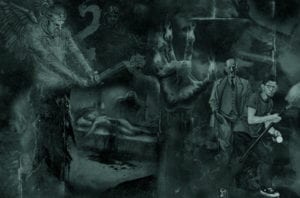Greetings, readers of the Fandomentals. The topic of today’s article is fairly specific – I would like to explain why I think the Netflix show Jessica Jones, which my fellow writers have gone over in detail, is a great, unintentional companion to Hunter: the Vigil, a tabletop RPG in the Chronicles of Darkness system. I have described it once, but looking back, I think I should have included more specific examples of what playing is like. I will try to remedy that now.
Hunter or superhero?
Now, I can hear you asking – “But Michał, doesn’t Jessica have superpowers? And Luke as well? How do they compare to mortal hunters?” That is true, which is why I want to focus on the atmosphere and experience, not direct parallels between the two. Jessica Jones and Hunter: the Vigil present two different worlds, but they evoke some very similar emotions.
Jessica is strong enough to lift a car and throw someone twice her body mass across a room. But it doesn’t really help her against Kilgrave’s mind control. She’s as vulnerable to it as a regular person. Same with Luke, despite his physical near-invulnerability. Jessica’s other allies (loosely speaking…), Trish and Will Simpson, are entirely normal people (maybe not entirely, in Simpson’s case), who can’t resist Kilgrave’s voice either.
Thus, trying to capture and detain Kilgrave becomes a paranoid mind-game. The protagonists must outthink and outmaneuver a man whose power they can’t resist directly. A direct approach is impossible, because as soon as Kilgrave is close, he can take total control of them.
They must also contend with the fact that anyone they meet could be Kilgrave’s slave. A breakthrough occurs when Jessica discovers that Kilgrave’s powers cease to function when he’s under anesthesia. Which includes releasing his victims from his control. However, Kilgrave manages to stay one step ahead… by hiring guards, instead of mind-controlling them. They save him after Jessica drugs him, since their motivation is money, rather than control.
Once we take out the name “Kilgrave”, what I just described may well be… a Hunter: the Vigil chronicle, where a lone cell opposes a powerful vampire with mind-control powers. I say vampire, because of all the different supernatural beings that populate the Chronicles, it’s the Kindred who have the most direct and convenient methods of mind control. They’re also perhaps the best-known.

The monster
Mages, mummies or demons can have similar powers, or greater ones, but they operate on a level no mortal human could even approach. Demons and mummies are also psychologically detached from humanity. Demons were never human to begin with, while mummies were human millennia ago and are now undying demigods. And the reason Kilgrave is so viscerally repulsive to the audience is that his evil is so human and close to home. A Mage’s motives remain human, unless they slide down some darker paths. But their power and innate traits render Sleepers (that is, regular humans) completely helpless.
If we go by Vampire: the Requiem rules, a vampire has one power to instantly control someone – the Dominate discipline. It has some restrictions Kilgrave’s power doesn’t have. For one thing, it requires eye contact, and a vampire can only issue orders to one person at a time. More importantly, in a combat scenario, using the power is an action, and giving the order is a separate action. If the victim has friends, this gives them crucial time to act.
This is significantly less versatile than Kilgrave’s ability to walk into a room and instantly bend everyone there to his whims. Of course, if someone is alone with the vampire, the difference lessens. If they’re among other people, it’s still not necessarily a problem, as the use of Dominate is subtle. Most humans, ignorant of the existence of the supernatural, will not notice it. Under certain circumstances, other vampires, supernatural beings and hunters can fail to notice this as well.

Controlling many people at a time can be accomplished with the Majesty discipline, which is a more subtle form of control. Instead of breaking someone’s mind like a toy, the vampire radiates irresistible charisma. They can walk into a party uninvited, splattered in blood, and everyone will just shrug it off. Once someone falls to their charm, they can twist their infatuation in powerful ways. A vampire with Dominate and Majesty is a terrifying puppet-master – and thankfully a rare one. Dominate and Majesty can be resisted every time they’re used, unlike Kilgrave’s power, but the odds are heavily stacked towards the user, particularly if the victim is a mortal. That being said, supernatural beings are also very susceptible to them; they have more tools to resist it. More importantly, they’re more aware of their existence so they have the potential to be better prepared.
That being said, a Storyteller (Dungeon Master) is under no compulsion to use rules from other games in the series. Hunter: the Vigil includes Dread Powers, which is a toolbox the Storyteller can use to create their own supernatural beings and creatures. Their main purpose is, of course, to allow Storytellers to run games without purchasing all of the other source books and expansions. But even if someone has them, we often want to create our own denizens of the Chronicles’ deep shadows, without shackling ourselves to other rulesets. For example: if we want to create a terrifying mind-controller who isn’t a vampire, mage or another established supernatural entity, we can do that.
Kilgrave is, after all, physically a human – and not an imposing one at that. It wouldn’t take much of Jessica’s strength to overpower him. Vampires, however, are undying predators, and even those who doesn’t focus on physical prowess are shockingly resilient. Additionally, Kilgrave’s only ability is his mind-control, whereas any member of a supernatural group within the Chronicle games have many others at their disposal.
Using Dread Powers to create someone whose mind control goes beyond even vampiric domination, but who is otherwise physically human, would be very simple. In the end, Kilgrave is an antagonist, while characters created with the main books of the game are protagonists. That doesn’t necessarily mean that they’re heroic by any measure, just that their powers have a different structure.
And against him is… a private investigator who was once his victim, a popular radio host with a connection to the private eye, a policeman who is clearly more than just a beat cop, and an invulnerable ex-con bartender. That’s a first-tier hunter cell if I ever saw one. And like I said before, the methods they use strikingly remind me of hunters. They avoid direct confrontation, where Kilgrave can overpower them easily. Once they find his weakness, they ruthlessly exploit it. They risk conflict with law enforcement to attack him. All of it costs them physical, emotional and mental damage, and they come into conflict with one another.
I should note that when I say “first-tier”, I mean hunters who operate on their own, on a local level and without the support of any larger group. They also don’t have access to any special equipment or powers that hunter conspiracies typically provide their members. Which, again, might seem to clash with the fact that Jessica and Luke do have superpowers. Despite all of that, the mood and structure of Jessica’s struggle against Kilgrave is quite reminiscent of a first-tier Hunter game.

The victims
Still, that’s the major dramatis personae. What about the world around them? In Hunter: the Vigil, mortals are ignorant of the supernatural. Or rather, they are aware of its existence on some level, but most simply repress it, rationalize it away or just outright deny it. There’s a supernatural energy pervading this world that makes them forget. Many magic beings have traits that more actively obfuscate them – it’s literally impossible for a Sleeper to remember seeing a display of Supernal magic, for instance. Vampires, if we’re sticking with treating Kilgrave as one, notably do not have such traits, which means they must take more active measures to keep their existence secret.
In Jessica Jones, it’s clear that people do know superpowers exist. The series takes place in the same universe as Marvel’s superhero movies, meaning everyone saw aliens, gods and superheroes tear New York City apart. Nonetheless, most people don’t believe in Kilgrave’s mind control.
It’s not quite the same situation as it is in Hunter: the Vigil, though. People who witness Kilgrave in action generally believe it. He very rarely displays any sort of subtlety. And when his victims come together to recount their experiences, they remember them clearly. Still, how many of them had spent years wondering if they had simply gone insane? How many were blamed for people who only saw mind control as a ridiculous excuse? Particularly since when Trish puts out a call for Kilgrave’s victims to come forward, there are those who try to blame him for their misdeeds, or are simply mistaken.
So even though there’s no overreaching conspiracy, or innate energy that makes people forget, the sense of isolation that hunters, and monsters’ victims (categories with significant overlap), feel is still present in Jessica Jones to a degree. Jessica doesn’t find much solace in the support group for Kilgrave’s victims. Her reasons are her own, of course, but it is a bit reminiscent of the isolation hunters feel from other mortal humans.
Jessica’s reluctance to be a hero, even though she has superpowers, isn’t particularly relatable to Hunter. The player characters of Hunter: the Vigil are mortal humans who either chose or were forced to stop ignoring the truth about the world around them. They take up the Vigil, which is a dangerous obsession to do something about it. Jessica has her share of struggles with the concept of heroism and eventually decides to act against Kilgrave, even though her first instinct was to run. But it’s not really the same thing.
In the end, Jessica makes sure Kilgrave won’t destroy another life, but it’s hardly a happy ending or heroic victory. Which is also true for most successful Hunter: the Vigil campaigns. Hunters can eliminate a monster that preys on people, but the toll on them is considerable. That’s if they don’t simply act in their own interest, or become fanatics who attack any supernatural being, no matter how innocent. Which brings the parallel to an end. I hope that, by drawing a similarity between the show and the game, I managed to help you understand what playing Hunter: the Vigil might be like, using a seemingly unlikely source.

